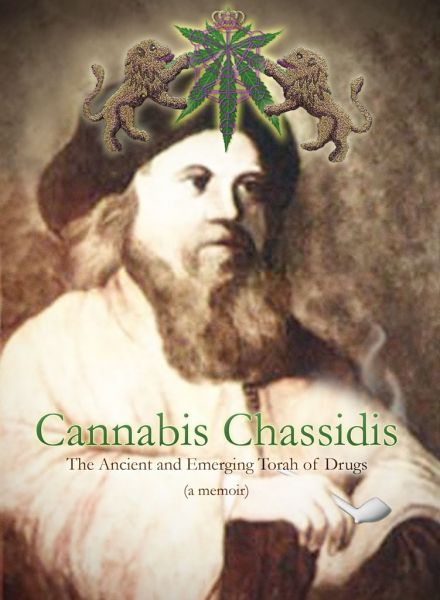 Here's a little experiment to determine immediately if you will like the book Cannabis Chassidis: The Ancient and Emerging Torah of Drugs, now available from Brooklyn's anarchist-oriented Autonomedia. Author Yoseph Leib has determined that the three letters in the Hebrew word for "smoke," ashan (ayin, shin and nun), work out numerologically to... 420. Get it? Mazel tov, dude!
Here's a little experiment to determine immediately if you will like the book Cannabis Chassidis: The Ancient and Emerging Torah of Drugs, now available from Brooklyn's anarchist-oriented Autonomedia. Author Yoseph Leib has determined that the three letters in the Hebrew word for "smoke," ashan (ayin, shin and nun), work out numerologically to... 420. Get it? Mazel tov, dude!
Leib has written an amusing 280-page rant celebrating the convergence of hippie spiritual-seeker and stoner culture with the mystical and ecstasy-seeking tradition in Orthodox Judaism—represented by Kabbalah, gematria (numerology), and the Hasidic subculture. Leib sees cannabis stretching back through the ages to the very roots of the Judaic ethos, enthusing that "The Messiah Gets High!"
There are lots of interesting angles in this book, but the case is made with less than Talmudic rigor. The footnote to Leib's contention that cannabis is mentioned in the Old Testament reads: "Exodus 30:12. OMG, you didn't know! I totally don't believe you." One wishes he'd skipped the stoner lingo in favor of fact-checking. In fact, the verse is Exodus 30:23, which notes offerings of myrrh, cinnamon and what is rendered in the King James Version as "sweet calamus." Leib fails to mention this common rendering, but notes that the word in the original Hebrew was kaneh bosm—meaning... aromatic cane. (Another clue that Leib doesn't mention is that the word "canvas" is basically a corruption of this Hebrew root, via the Greeks—speaking to the plant's dual use as herb and fiber source. The words "canvas" and "cannabis" are almost certainly cognate.)
Leib puts forth the theory that Baal Shem Tov, founder of the Hasidic movement, was toking back there in 18th century Poland. He cites sources claiming that the great revivalist rabbi liked to smoke his lulke (water-pipe) after havdalah, the weekly ceremony marking the end of the Jewish sabbath, after which he would wax loquacious, spinning folktales with "deep religious meaning." However, Leib doesn't provide a source for his claim that a test on the patriarch's pipe revealed traces of cannabis resin.
Leib draws inspiration from the tzaddiks (also rendered saddiks), the high holy men of the early Hasidic movement who were thought to posses mysterious spiritual powers—and who he of course thinks were hitting the lulke pretty often. He follows the tradition through to Shlomo Carlebach, the charismatic singing rabbi who won a following among Jewish hippies in Berkeley in the ‘60s.
Some of Leib’s other heroes are viewed as downright heretical by the contemporary Jewish establishment—like Shabtai Tzvi, the "false messiah" who led a somewhat fanatical revivalist movement in the 17th century, when the Jews in Poland were getting kicked around terribly by the Russian Cossacks. Perhaps even more controversial is Yaakov DeHaan, an Orthodox spiritual leader who was assassinated by the Zionists in Palestine in 1924 for dissenting from plans for a too-secular Jewish state, and advocating co-existence with the Arabs. (Ironically, Israel’s contemporary haredim, or ultra-Orthodox, are often the most intolerant towards the Arabs.)
Leib relates his experiences at the Israeli Rainbow Gatherings and with the blooming "chassidic reggae" scene in Israel and the diaspora. But his chapter "Justifying Israel" fails to—it barely grapples with the gigantic question of the Palestinians and the fact that the Jewish state is built on stolen land, and continues to colonize Arab land. He writes of his time hanging with fellow Judeo-hippies at the yeshiva in Bat Ayin—without telling us that this is not in Israel but the occupied West Bank!
Leib does take a sophisticated attitude towards cannabis use and spirituality, respecting the herb's proper place—noting, for example, that it isn't good for learning new passages of the Talmud, but excellent as an aid to meditation on their meaning afterwards. But sometimes his cautions nearly degenerate into puritanical wackiness—for instance, the warning that cannabis, like masturbation, drains one's "life essence."
Baal Shem Tov's iconic portrait adorns the book's cover—with a cannabis leaf superimposed on his forehead, flanked by images of the Lion of Judah. How would the revered master have reacted to that image, one wonders? Still, whether or not cannabis use is really deeply rooted in Jewish history, the cultural convergence that Leib manifests is creating its own mythology and doctrine. However imperfectly realized, his book is the first to commit this vision to the annals of written Jewish lore. Certainly a mitzvah.







Comments
Is cannabis kosher?
Not for Passover, according to The Forward. In 2007, Israel’s pro-legalization Green Leaf Party declared that cannabis is among the substances Jews are forbidden to consume during Passover. “You shouldn’t smoke marijuana on the holiday, and if you have it in your house you should get rid of it,” Michelle Levine, a spokeswoman for the party, said at the time.
Why? Because hemp seeds are considered to be kitniyot. While biblical law prohibits eating leavened foods, rabbis have since extended the rules to apply to foods like beans, corn and rice. Hemp seeds, found in marijuana, fall under that category—if you’re Ashkenazi that is. Sephardic Jews have traditionally been allowed to eat kitniyot during Passover.
There have been reports in the past of kosher for Passover pot cookies. Cannabliss, an Israeli company that supplies medical marijuana to Jerusalem's Hadassah Hospital, makes them with matzo meal or potato flour.
Ancient stash found in Judahite shrine